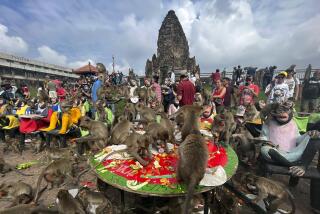Cambodia seeks U.N. help to halt battle with Thailand at ancient temple
Cambodia asked U.N. peacekeepers Monday to intervene to help end fighting along the Thai-Cambodian border after a fourth day of gunfire killed at least five people near a disputed 11th century temple.
The wrangling over the 2-square-mile complex, a World Heritage Site, has fueled fears of a protracted border conflict between the wary neighbors.
Cambodian Prime Minister Hun Sen requested a U.N. “buffer zone,” adding that the conflict threatened regional stability. United Nations Secretary-General Ban Ki-moon called on both sides to exercise maximum restraint.
But Prime Minister Abhisit Vejjajiva of Thailand, the regional powerhouse, resisted U.N. intervention and a mediation offer by the 10-member Assn. of Southeast Asian Nations, calling instead for direct negotiations.
About 15,000 Thai villagers have fled the area since the fighting started. Each side accuses the other of shooting first and insists it acted in self-defense. Abhisit said Sunday that his government wanted a peaceful resolution, but added, “If our sovereignty is violated, we have to protect it.”
Cambodian officials said over the weekend that Thai artillery collapsed part of a wing at the temple, but Thais denied that and called it propaganda. UNESCO has described the temple as an “outstanding masterpiece of Khmer architecture.”
Thailand, with a population of 66 million and annual economic output of $312 billion, dwarfs Cambodia’s 15 million population and $11-billion economy.
Thai officials have denied suggestions that they’re intimidating Cambodia.
The dispute involves a picturesque, crumbling Hindu temple known as Preah Vihear in Khmer and Prasat Khao Phra Viharn in Thai, built between the 9th and 11th centuries by the same Khmer dynasty that built Angkor Wat.
Demarcation has long been controversial as borders have fluctuated over the centuries. In 1962, the International Court of Justice put the temple inside Cambodia. But Thai nationalists disputed the decision, with tensions intensifying after the religious complex received World Heritage Site status in 2008.
Analysts said hard-liners had seized on the issue in recent days to score political points. “With archnationalists influencing public policy on both sides of the border, the danger of intensified frontier friction is very real,” said Paul Chambers, a research fellow at Germany’s Heidelberg University.
Roughneen is a special correspondent. Times staff writer Mark Magnier in New Delhi contributed to this report.
More to Read
Start your day right
Sign up for Essential California for news, features and recommendations from the L.A. Times and beyond in your inbox six days a week.
You may occasionally receive promotional content from the Los Angeles Times.






